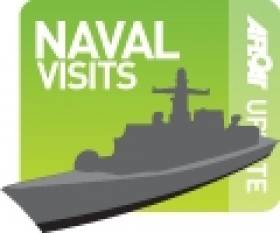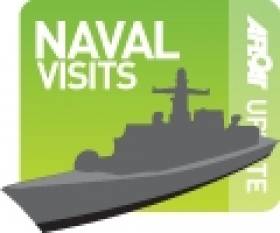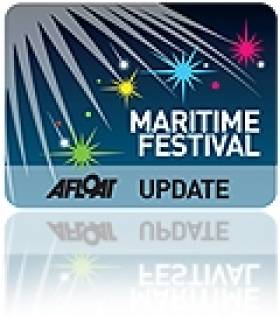Displaying items by tag: Foyle Days
Anglo-Irish Relationships
#NAVAL VISITS- HMS Tyne (P281) the leadship of four River-class Fishery Protection Vessels is due to dock in Dublin Port tomorrow, in the meantime her allocated berth is currently taken by a former Royal Navy (RN) vessel now serving in the Irish Naval Service (INS), writes Jehan Ashmore.
The INS L.É. Ciara (P42) docked at Sir John Rogersons Quay (berth No.8) yesterday evening after spending the previous day with a call to Dun Laoghaire Harbour's St. Michaels Wharf. Tomorrow she is due to depart in advance of HMS Tyne's morning arrival.
Unusually she and her three sisters are leased to the RN from BAE Systems (who retain responsibility for any major maintenance and upkeep) and shipbuilding partners, Vosper Thornycroft, Southampton which built all of the River-class. To read more about the quartet click HERE.
L.É. Ciara was originally launched as HMS Swallow (P242) at Hall Russell Shipyard, Aberdeen and in 1984 was commissioned for the RN, forming one of five 'Peacock' class coastal patrol vessels (CPV). She served her entire RN career with sisters designed specifically for the Hong Kong Squadron.
In 1988 the INS purchased her alongside a sister HMS Swift (P243) and the pair set sail from the UK colony for Cork Harbour. L.É. Ciara and her sister which became L.É. Orla (P41) were commissioned into the service after a ceremony performed by An Taoiseach C.J. Haughey at the Naval Base in Haulbowline.
Amongst the eight-strong INS fleet is L.É. Emer (P21) commissioned in 1978, an improved version of the Deirdre-class offshore patrol vessel (OPV). She appeared along with a sister of the River-class ship, HMS Severn in the Irish language river series 'Abhainn' which returned to our screens on RTE 1 last month, during the episode about the River Foyle /An Feabhal. The naval vessels were attending 'Foyle Days' in May as previously reported on Afloat.ie
- Irish Naval Service
- Dublin Port
- naval service
- Royal Navy
- Dun Laoghaire Harbour
- Peacock Class
- Hall Russell
- Foyle Days
- Naval Visits
- River Foyle
- Coastal Patrol Vessels
- HMS Tyne
- RN
- INS
- Hong Kong Squadron
- Fishery Protection Ship
- BAE Systems
- Vosper Thornycroft
- Haulbowline Naval Base
- Deirdreclass
- Abhainn TV series
- HMS Severn
- Irish River TV series Abhainn
Navies Northern Adventure Head for 'Foyle Days'
On the naval front, LE Emer was built in Cork's Verolme Dockyard in 1978. She represents the oldest of the eight-strong fleet and is designed from the Naval Service's first purpose built patrol vessel OPV LE Deirdre (P20) but was modified to improve her stability and speed. This vessel was decommissioned several years ago and was converted into a private yacht.
The original BOFORS 40mm L60 gun of the LE Emer was recently upgraded to a BOFORS 40mm L70 to improve range and accuracy of her main armament. She alongside her 65m sisters LE Aoife (P22) and LE Aisling (P23) where all built primarily to patrol the Irish section of the European Economic Zone (EEZ).
During their careers the 'Emer' class vessels have also completed numerous re-supply missions to Irish troops serving overseas with the United Nations and in particular in the Lebanon. A crew compliment of 46 (5 officers) operate the vessels which are all now in their fourth decade of service.
OPV HMS Severn is the third of four 'River' class offshore patrol vessels and like her Irish counterpart is deployed on fishery duties. The 1,677 displacement tonnes vessel was built in 2001 in the UK'S south coast port of Southampton at Woolston Docks. Her home port for the 30 crew is at HM Naval Base in neighbouring Portsmouth.
She becomes the fifth ship to bear the name and with sisters HMS Mersey (P 282) and HMS Tyne (P 281) they are assigned to the Fishery Protection Squadron. Click the ship's diary to follow the ship news. The final member of the River class HMS Clyde (P 257) serves as a Falklands Islands Patrol Vessel (FIPV).
- yacht
- Clipper Round The World Race
- naval service
- Derry
- Royal Navy
- Londonderry
- Ports and Shipping News
- JOHANNA LUCRETIA
- Verolme Cork Dockyard
- United Nations
- Foyle Days
- Offshore Patrol Vessel
- Maritime Festivals
- LE Emer
- Emerclass
- LE Deirdre
- HMS Mersey
- Riverclass
- Schooner
- HM Naval Base Portsmouth
- Falklands Islands
Boats Head for 'Foyle Days' 2011
Over the years she has changed hands between Dutch and UK interests for recreational use. Several years ago she starred in the RTE TV reality show 'Cabin Fever' where she replaced the show's first ship Camaret of Cornwall (branded as 'Cabin Fever') after it ran aground off Tory Island.
During the two-day festival (11am-5pm) the boating community at the event will include the Coleraine Yacht Club, Foyle Paddlers, Foyle Punts, Lough Foyle Yacht Club, Lough Swilly Yacht Club, Moville Boat Club, RNLI and the Foyle (SAR) Search and Rescue.
Visitors to Foyle Days can call to the Clipper stand and learn more about the city's entry of the Derry~Londonderry boat in the 2011-2012 Clipper Round the World Race. Learn more about the countries the crew will visit and also how to get involved in the event. For more information about the race, at 40,000 miles is the world's longest race go to www.clipperroundtheworld.com/
Running alongside the festival a continental market with 40 stalls will be open to all at the recently revamped Guildhall Square. For further details about Foyle Days click here.
- Clipper Race
- Maritime Festival
- RNLI
- Lough Foyle Yacht Club
- Lough Swilly Yacht Club
- Moville Boat Club
- Derry
- Londonderry
- Tory Island
- JOHANNA LUCRETIA
- Foyle Days
- RTE TV
- Cabin Fever
- Camaret of Cornwall
- Grounding
- Reality TV show
- Clipper Around the World Race
- Guildhall Square
- Continental Market
- Coleraine Yacht Club
- Foyle Search and Rescue
- Foyle Paddlers
- Foyle Punts
- Offshore Sailing
- Clipper Round The World Race
- JOHANNA LUCRETIA


























































